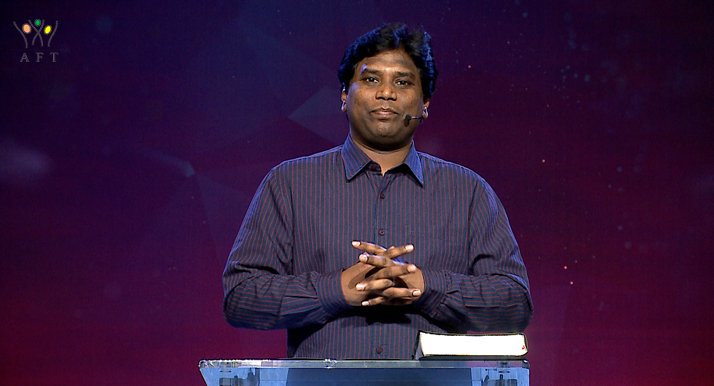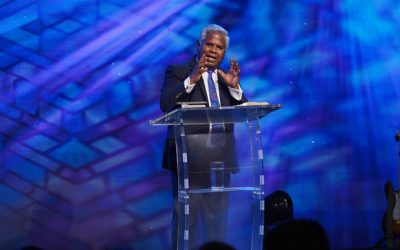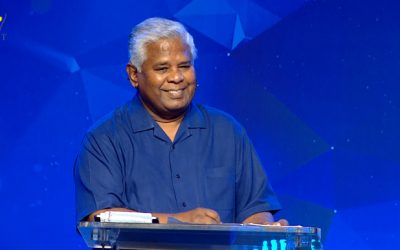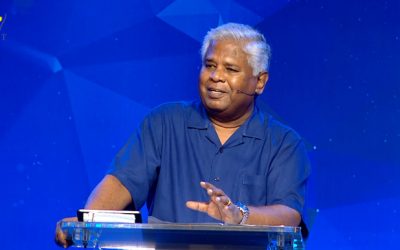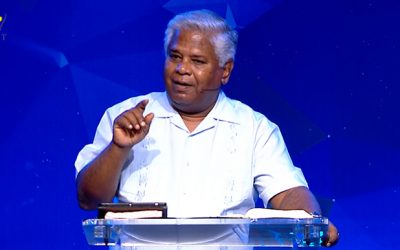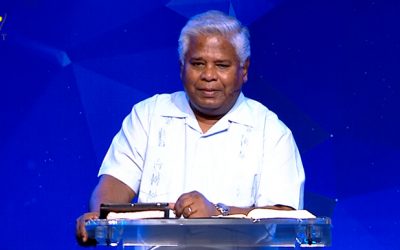
The Christian Way of Approaching Adversity (Part-14) – Blessings of Salvation: Forgiven & Cleansed
Sunday English Service – 13 JUN 21
Transcript
When many things around you are being shaken up. It’s good to go to a place where things are not getting shaken up. Seems like in this world that we live in today, everything around us is changing, everything has been shaken up, so to speak. But there are some things that don’t change; there are some things that are as solid as ever. And one of them is our great salvation. That’s what we’ve been talking about—our great salvation—because I see that as something that is untouched, unaffected by all that’s happening around us. This last one year all kinds of things have happened. Seems like everything is affected by it but not your salvation. Not your salvation. Your great salvation. The Bible calls it as “a very great salvation”; “So great a salvation”, Hebrews chapter 2 says, has not been touched, or affected one bit, by all the events that have happened around us. That to me is amazing. That is why I think it is worth looking at, continuing to look at our great salvation.
Last week we spoke about the greatest danger that we’ve been saved from, which is sin. And what it ultimately leads to, which is hell. This week I want to start talking about the blessings of salvation. The blessings of salvation. Salvation has given us so many blessings. And, you know, as I said earlier, salvation is like a big package. When you get saved, not only do you get salvation but in this one big package of salvation, you get all kinds of blessings, so many blessings. We’re going to look at just a couple today.
When you look at this today, when you consider what I’m going to tell you today—we’re just going to look at two blessings of salvation—I believe that by the end of today’s message, my hope is that your heart will be filled with thanksgiving, because we’re going to talk about what you have received in salvation. Right. And so, that will cause thanksgiving to flow in your heart. It is in the heart of thanksgiving that faith can operate. Where there is thanksgiving, only faith can operate. And I believe that by the end of the message, your heart will be filled with a faith, with a certain kind of confidence that the God who has done this for you, saved you and given you these blessings, will do more, will do what you need Him to do in your life today. But the thing is, I want us to focus on the blessings we have received because if we just keep focusing on what needs to come, what needs to happen, what is not happening, if our focus is always there, you see, there won’t be thanksgiving, there won’t be confidence. You know, instead of thanksgiving, you’ll end up with murmuring and complaining. Instead of confidence, you’ll end up with doubt. So, by the end of today’s message, I hope that you will flow with thanksgiving, confidence, and also joy. The hope is that you will rejoice because, as a Christian, as a believer, we don’t need all our circumstances to go smoothly and well for us to rejoice and have joy. Our joy is not dependent on our circumstances, right. Anybody can rejoice when things are going well, but a Christian believer—a true believer—is one who can rejoice, even in the midst of difficult circumstances. How do you rejoice? Well, this is one of the ways. When you consider the great blessings that you have in salvation, it will cause you to rejoice. So, let’s begin to look at this: The blessings of salvation.
As I was preparing for this, I first thought that I’ll just talk about the greatest blessing we received in salvation, just one blessing, because last week I spoke about the greatest danger, you know. And so, I thought this week I’ll follow it up with just one blessing—the greatest blessing—that we have received in salvation. But as I was thinking and preparing, I started listing down the different blessings we have received from salvation, in salvation. And what I realized is, as I was listing them down and as I was thinking about them, I realized that even the smallest blessing of salvation, or even the most basic blessing of salvation is actually glorious. What we consider as the most basic, the most fundamental, the most simple blessing of salvation, even that, is actually quite glorious. And so, I abandoned that idea of just talking about one blessing and I want to talk about different blessings. It’s like the Himalayan Mountain range. It’s a beautiful mountain range, it has a peak, the highest mountain in the Himalayas is Mount Everest. But we can’t say only Mount Everest is beautiful, we’ll have to say the entire mountain range is beautiful. So that’s how I see salvation. It’s like this beautiful, glorious mountain range, like the Himalayas, and even the smallest mountain there is still beautiful and glorious. The so-called “smallest” and so today, we’re going to begin with the most basic blessings or the most fundamental, the simplest or what some would call as the “smallest” blessings of salvation, but I’ll show you that it’s not so small. It’s actually quite great and glorious. Let’s begin. Let’s talk about these blessings of salvation.
First—we’re just going to talk about two today—first: forgiveness of sin. That’s as basic as you can get, right. Our sins have been forgiven. This is probably the most fundamental blessing we received in salvation. Our sins have been forgiven. I’m asking you to stop and think about what an amazing thing that is today. Have your sins been forgiven? If you’re saved, if you are a true believer in the Lord Jesus Christ, if you’ve put your trust in Him and faith in Him, that means your sins have been forgiven. I want you to think about this: ALL our sins have been forgiven. We spoke, last week, that sin is the greatest danger. But the amazing thing about salvation is, the most simplest blessings, forgiveness of sin says, “All our sins are forgiven by Christ, by His work on the Cross, for us”. “All our sins”.
Now, just think for a minute there, how many sins, a person commits in their lifetime. Just let your mind run in that direction. You think about your sin; I’ll think about my own sin, right. I mean, how many sins do we commit in one lifetime? It’s unbelievable, isn’t it? If you talk about sin, there’s different kinds of sin: there are sins of action; there are sins of thought; there are sins of motive. If you look at sins of action—usually people think of, when they think of sin, they think of actions alone— wrong actions, right—but even if you take actions alone, you can split them up into two. There are sins of commission and there are sins of omission. Sins of commission are, where you do things that you’re not supposed to do; you do the wrong things. That’s what people usually think of sin as, right. You do the wrong thing; you commit the wrong actions, sins. But there are also other things called, sins of omission. That is where you don’t do what you’re supposed to do. That is also sin in God’s sight.
So, we do what we’re not supposed to do – that is sin. We don’t do what we’re supposed to do; we refrain from doing that. That is also sin. We omit doing things, right, good things. And so, just in action, we do so many sins, but not just action. The Bible says, “Even wrong thoughts, sinful thoughts are sin, are considered sinful, right. We can sin in our thoughts, without sinning in action. Jesus says that the commandment murder, “Thou shalt not murder”, does not extend only to action, but also thought. “If you’re angry with your brother without cause, then you’re guilty of violating that command, in your thoughts”, He says. Jesus says, “If you lust after a woman”—your thoughts—“you have committed adultery, with her in your heart”. So, God doesn’t just look at action, He looks at our thoughts and not only thoughts, but He also looks at the motives. Sometimes our actions are right and good. We do the right things, for the wrong reasons, the wrong motives. And God looks at that as well, you know. God is just a perfectionist. He just doesn’t look at the outward action alone, He looks at the heart. Why you’re doing that, what the other reasons, what are the motives behind that and so on. So, you know, you have wrong actions, you have wrong thoughts, you have wrong motives. Just think about how many sins we commit in a lifetime; I mean, it is enormous. It is enormous. And in salvation, what you receive is forgiveness of sin. And if you rightly understand the forgiveness of sin. What it says is, “all your sins have been forgiven”. All your sins: your wrong actions, your wrong thoughts, your wrong motives, all of it, forgiven. Let me also put it like this because I want you to grasp the fact that all your sins are forgiven, your past sins, your present sins, your future sins, forgiven.
For some people, when I say that, they may react shocked. How can you say your future sins are forgiven? You see, people say, from the perspective of the Cross. In our perspective, only be divided into past and present and future. Right. But think from the perspective of the Cross because that is where our forgiveness of sins was achieved, accomplished. On the Cross when Jesus died, we were not even born, all our sins were in the future. From the perspective of the Cross, all our sins were in the future.
So, today, we stand here, and we think—some people think—my past sin is only forgiven; my future sin is not forgiven. God help you, my friend, if your future sin is not forgiven. Are you telling me, you’re going to live a perfect life for the next so many years? May God have mercy on you if that’s the case. Nobody’s going to live a perfect life, that’s just ridiculous; that’s impractical, my friend. Nobody’s perfect in this life. Which means, you better have your future sins also forgiven, otherwise you’re finished. In any way, from the Cross, all our sins are in the future. So, this dividing up into past and present and future and saying, “future is not forgiven, only this and that”; that’s nonsense, really. On the Cross, all our sin was laid upon Christ, and He paid for all of it. And when we are saved, we receive the forgiveness of sins. Yeah, I understand that. After we’re saved, when we sin, we have to confess our sins and, you know, then we are cleansed and forgiven. I understand all that. But what I’m saying is, on the Cross, all if it was prepared and made ready! Your entire forgiveness, for your entire life, made ready on the Cross, finished, available to you. All your sin. It’s amazing. Just think of that. And it’s forgiven by God.
I want you to think about this. I want your mind to think about this. What people call as a basic thing, basic blessing, simple thing, is not so simple, it’s amazing. All my sins are forgiven by God. Even when a human being forgives us, it gives us such peace, it gives us such comfort, even joy. Have you committed something wrong against someone, done something, committed an offense against someone and then you go and ask them for forgiveness, and they forgive you? Or maybe, you don’t even ask for forgiveness and they still forgive you. How good that makes you feel, how relieved it makes you feel, how much peace that gives you, right. Especially if the one who forgives you is a very great person.
I’m thinking of Joseph, in the Old Testament, when he was Prime Minister of Egypt. He forgives his brothers who committed so many atrocities against him. He could have done anything, he could have used this power and wiped them out, but he chose to forgive them. I mean, imagine how relieved the brothers would have felt that their brother—the Prime Minister of Egypt, the most powerful person in the land, almost—forgave them. A human being, forgiving, means so much. But let me tell you, my friend, if every person forgives you, if every human forgives you, but God doesn’t forgive you, it is meaningless, it is not enough, it amounts to nothing. Just think of this: If every person you commit an offense against, forgives you, but God never forgives you, it’s not enough, it’s meaningless. Do you know why? Because every sin ultimately is committed against God. Everything sin is ultimately committed against God. Every sin, every violation, every wrong act, thought, motive is a sin against God, finally. And so, others forgiving you is good, it will give you some peace and all that but it’s not enough. God has to forgive you. Everybody forgives, God doesn’t forgive. We’ll end up in hell, that’s what will happen. It’s simply not enough for salvation, right. Reverse that, if God forgives you, and no one else forgives you… Let me say that again: imagine God forgives you, but no one else forgives you. That kind of scenario is possible in some extreme cases. Think of like a very bad criminal, just to give you an example, right. Think of a very bad criminal, who’s done horrible things. The entire society just hates them. They don’t forgive them. The authorities can’t forgive them, the legal system, the courts can’t give forgiveness to them, they’re the worst criminals, imagine. I’m just giving an example. In some cases, people who commit great crimes, their own family, will not forgive them. Even they can’t forgive. In some cases, the criminal himself cannot forgive himself for what he has done. In such a case, where nobody can forgive that person, if God alone forgives him, let me tell you, that is enough for his eternal salvation. If there is a person like that—it’s possible—who has done horrendous, horrible things, whom no one can forgive; society can’t forgive, their family can’t forgive, they can’t forgive themselves. But if God forgives them, that is enough for their eternal salvation. And I want to tell you today, God is ready to forgive. There is no one beyond the scope of God’s forgiveness. No one, no matter what you have done, no matter what your crime is, or how great a criminal you think you are. If there is a person like that, listening to the sound of my voice, I want to tell them that God is ready to forgive. No one forgives like our God, and no one is beyond the scope of God’s forgiveness, beyond the reach of God’s forgiveness.
Isaiah 55, verse 7: Let the wicked forsake his way, and the unrighteous man his thoughts. Let him return to the Lord. It’s saying, “Let the wicked forsake his way, and the unrighteous man his thoughts. Let him return to the Lord.” Why? That He may have compassion on him and to our God, for He will abundantly pardon. This verse, and other verses, tell us how God has compassion on the wicked. On the wicked, on the unrighteous and abundantly, He pardons, “abundantly pardons”. Nobody forgives like our God, abundant in forgiveness, abundant in mercy, even to the wicked, even to the wicked. We will say, “Oh, we’ll forgive the deserving”. God says, He’ll forgive the undeserving, the wicked. So, no matter who you are today, come to this God. All you’ve got to do is believe in Jesus, that He bore your sin on the Cross of Calvary, that He shed His blood for you, that He suffered and died for you and rose again, and I tell you, you can receive God’s total forgiveness now. Now! No man can forgive you, but God can forgive you. This is not just for the worst criminals, by the way, this is for everybody. I’m saying it applies even to the worst criminals, but it is for everybody. Everybody needs God’s forgiveness. Without God’s forgiveness, everything is in vain in the end, everything is in vain. Because, you see, without God’s forgiveness, we would end up in hell, like we said last week. Without God’s forgiveness, no matter what you achieve now, will be pointless because in the end, in eternity, it will mean nothing. Think about this.
Look at Psalm 130, it talks about how everybody needs God’s forgiveness. I’m not trying to say everybody is worst a criminal. No. The problem is, God is too perfect. God is simply too perfect, His standards are too high, He expects just perfection from us as well. And so, nobody can match His expectation. Psalm 130, verse 3 and 4. If you, O Lord, should mark iniquities, O Lord, who could stand? He’s saying, “If You started grading us, O Lord, if You started putting down grades for us, who could stand? If you started marking iniquities, who could stand before You?” Nobody can stand, that’s what he’s trying to say; nobody can stand before God. If God starts marking iniquities, everybody will fail, everybody will fail. That’s why the Bible says, “All have sinned and fallen short of the glory of God”. Nobody passes the test before God. From the worst criminal, to the best behaved, you know, the most loving, and the most amazing person you can think of on earth. Everybody fails before God. Because He’s so perfect, so Holy, there’s no one like Him. If you, O Lord, should mark iniquities, O Lord, who could stand?
And then, the answer comes in verse 4. Nobody can stand, but there is hope. Why? Because with You, there is forgiveness. See what the Psalmist says? He says, “Who could stand?” And then he says, “But with You, there is forgiveness, that You may be feared”. It’s amazing the way he says it. “With You, O God, there is forgiveness, that You may be feared”. You know what that means? He says, “God, You forgive so extravagantly, so greatly, that looking at Your forgiveness, people have a certain fear of You. It inspires fear; Your forgiveness inspires fear.” Usually, we don’t thing in those terms, do we? We think of the power of God, inspiring fear in people or the holiness and the righteousness of God inspiring fear, right? You look at the power of the holiness and the righteousness and the greatness of God and you fear Him in a good way. But this verse is saying, “The forgiveness of God inspires you to fear”, means, His forgiveness is so extravagant, it’s so unconventional, is so extreme, that it inspires fear in people; it causes people to fear God just by looking at the way He forgives. Nobody forgives like our God. All our sins are forgiven by this amazing God. Think of what a great blessing this forgiveness of sins in. Think about the great cost, the great price that was paid for our forgiveness.
You see, a great price was paid, a great cost was born. See, forgiveness is free for us, easy for us to receive. Today, you don’t have to stand upside down, you don’t have to struggle to be forgiven by God. No. God has made it so easy. He just said, “You come to Jesus; you believe in Jesus, that’s all”. That’s not difficult at all. The only thing that is stopping people from doing that, is their own pride. They think they can handle it themselves. But God has made forgiveness easy for anybody today. He says, “Come to Jesus, believe in Jesus, believe that Jesus bore your sin”, that’s all. Put your faith in Jesus. He’s made it so easy, and it is free for us. But the thing is, He bore a huge cost, huge cost. Whenever there is great forgiveness, somebody has to bear the great cost. Not somebody, the person forgiving, has to bear the great cost. Whenever there is forgiveness, the one forgiving has to bear the cost.
You see, people don’t understand this. Sometimes you will see people objecting to the Christian truth of forgiveness and they will say, “Why does your God need a Cross to forgive? Why does He need His Son to shed blood and then only give forgiveness of sin? All this is so unnecessary, it’s so extreme. Why can’t He just simply forgive us and go? Why can’t He just forgive like you and me? You know, you do something wrong against me, I’ll say, “I forgive you” and we can just move on. Why can’t God do the same?” They don’t think deeply enough about forgiveness. Wherever there is forgiveness, the one forgiving, bears the cost, bears the pain. I’ll give you an example: Imagine you have a car. Somebody comes and steals your car. They steal your car, and then they go driving on the road recklessly, get into an accident, the car is badly damaged, and they escape. They are fine but the car is terribly damaged. Just imagine. You come to find out and you go, and you know, the police have that person. Right. And you go there, and you find out that this person who stole your car and wrecked it by driving recklessly, damaging it completely, this person, you find out has no money. Then you find out, this person has no insurance, no nothing. They don’t have anything; they stole your car and did this. Now, what do you do? You have a few options: Justice; you can go the way of justice and you can say, “You’re the one who did the stealing; you’re the one who did the reckless driving; you are the one who wrecked my car, so you’ve got to pay”. And justice will be on your side if you go that with that option. Even if they can’t pay, you could take them to court and you could force them, somehow. They will be in debt for the rest of their life maybe. But you can take some steps. Justice will support you.
Or maybe, you have another choice: you forgive that person. Imagine that you look at that person, you see they have no money, you realize that if you make them pay for this, their already sad life will become terrible, their whole life will become ruined because they will be in debt for the rest of their life trying to pay this off. And so, you see their plight and their condition, and you have mercy on them, imagine, and you forgive them. You tell that person, in the police station, “Listen, I forgive you. You don’t have to pay for the damage, you don’t have to do nothing, you can go free. I forgive you; I just release you”. Everybody will be amazed. The fellow will be amazed. He’ll walk away. Now, what happens there? He receives the forgiveness. Easily he gets it. He gets it for free. He doesn’t have to do anything, he doesn’t bear any cost, any pain, but somebody’s got to bear the cost. Your car is still damaged and wrecked, has to be repaired. Because you forgave him and let them go, now you have to pay for the damage of your own car, even though you didn’t do nothing wrong. You pay, and you get it fixed, or if it’s so badly damaged and you can’t pay, then you have to lose your car. What I’m saying is, you bear. Somebody bears the cost. The one forgiving, bears the cost, the pain.
People don’t realize. They just think, forgiveness is cheap and easy. No, no, no. For a car, if there is so much involved, think about our sin. Think about how complicated it must be to forgive all our sin. Just think about that. That’s what God does; He forgives all our sins. Think about what a great cost that must involve. That’s why we have the Cross of Calvary. Without the Cross, God cannot forgive sin. I say that, respectfully. Without the Cross, God cannot and does not forgive sin. On the Cross, what does God do? He gives His Son to die for us; the Son gives His own life, suffers every kind of suffering, unspeakable suffering. Last week I told you, Jesus Christ went through hell for us on the Cross. The Cross was hell for Jesus. He went through every kind of suffering, every kind of pain; that’s what it took to give us forgiveness. We get it free; we get it easy, but a great cost was born, a great price was paid. Jesus absorbed the pain. What a great forgiveness.
Ephesians 1:7 puts it like this: In Him we have redemption through His blood, the forgiveness of our sins, according to the riches of His grace. We think forgiveness is a light blessing, small blessing, basic blessing. Look at how Paul speaks about it. “In Him we have redemption through His blood, the forgiveness of our trespasses, according to the riches of His grace”. Do you know what he’s saying? It’s a little unclear, maybe to you. What he’s saying is, this forgiveness of sin, took the riches of God’s grace, to give it to us. God couldn’t give it easily, lightly, He had to be so rich in mercy and grace and He had to show the riches of His grace, in order to give us the forgiveness of our sins. What a great forgiveness. If you believe in the Lord Jesus—if you’re a true believer—you have already received this. And, in case you have not received it, no matter who you are today, I give you an open invitation, because our God forgives anyone, anybody. All you have to do is come to Him, seek His forgiveness, humble yourself before Him, believe in Him, believe in what Jesus did for you on the Cross. You can receive this forgiveness, right now. Once you get it, there’s nothing like it. If you have this, even if you fail in everything in life, you’re set for eternity. If all your sins are forgiven, even if you end up a failure in life, your eternity will be amazing, just hypothetically speaking, right. Opposite scenario, if you succeed in everything in life, have great achievements and accolades, and in the end, your sins are not forgiven, it is in vain, for nothing, no use, because all the accolades and achievements cannot take you to heaven.
I read about a pastor in the United States, in the U.S, who pastors a church in Washington DC, the capital of America. He pastors a church, right in, what is called the Capitol Hill area in Washington DC. Washington DC is the capital, where all the important government buildings are, and, in that city, there is this area called the Capitol Hill, where—what they call—is the Congress or the Parliament. The U.S. Parliament, you know, their White House is nearby, and all the big government buildings are right there; a very important area and his church is right there. And so, he talks about how he takes his dog for a walk in that area, and there, there is a big cemetery, right. A famous cemetery, where some of the famous U.S. personalities, presidents and other people are buried, you know, war heroes. And that cemetery is filled with star-studded names on the tombstones, ex-presidents, and war heroes and all these great people.
And so, this pastor talks about how he takes his dog for daily walks in that area. And as he walks through that cemetery, he says, he’s always amazed, that here like these people, who were some of the greatest heroes of their days, some of the greatest personalities, who achieved so much. And he finds it strange that he’s walking his dog, or, you know, across, near their graves. And he says, sometimes the thought comes to him that, “Here are these great men, they’ve achieved so much, but in the end, all their achievements, don’t count for anything, unless they’re forgiven”. Think about that. All their achievements—they can be ex-presidents, war heroes, all this, all their achievements—what do they count for eternally, if they are not forgiven? What value do they have in eternity, if they have not received the forgiveness of sins that God alone can give? Because all your achievements and accolades that you achieved throughout this life, even if you live to 120 years and achieve everything there is to achieve, if there is no forgiveness of sin, eternity itself is gone. In the context of eternity, 120 years is nothing. With this one thing, you have everything; without this one thing, you lose everything (eternally speaking). This is huge! And every believer has the forgiveness of sin. I’m not saying, as a believer, you have to be a failure in life and only succeed in eternity. No! I’m saying, even if you are, even if a person is a failure in this life, they will still, they are still victors, because from eternity’s perspective, they’re victors. But nobody’s a complete failure in this life, right. I’m saying, extreme case, hypothetical, just to show you how crucial and how important and how great this forgiveness of sins is. I say to you, if you’re a believer in the Lord Jesus Christ, your sins have been forgiven, and I say to you that you are already a winner for eternity. You need to see yourself like that. If you have nothing but salvation today, you have forgiveness of sins, I say to you, you have already won. You are a winner for all eternity.
We have spoken about the greatness of forgiveness of sins. Now let me give you an application of this, right? Let me give you an application of this. Let me show you what kind of difference this can make in your life. Now, here’s the application. Even a minimal understanding of salvation—forgiveness of sin, is considered minimum, right—minimum blessing of salvation, starting blessing, simple blessing, basic, fundamental blessing, right. Everybody knows we have that; everybody agrees on this. So, minimum. Here’s the application. This kind of minimal understanding of salvation itself, is enough to make you rejoice and be thankful and to never get discouraged, completely. Let me say that again. If you simply have just a minimal understanding of salvation, that is enough. That is enough to keep you rejoicing, keep you thankful and keep you going, no matter what life throws at you. You don’t have to ever be totally discouraged.
Go to Luke, chapter 10. People this this, you know, salvation, forgiveness of sins, what relation does it have to practical life? How does it help practical living? Oh, it helps a ton, my friend. If you understand what an amazing thing is one thing is, it’ll always keep you rejoicing, it’ll always keep you thankful and you can face any situation without losing all hope. You can keep going no matter what comes against you. Luke, chapter 10, verse 17 onwards. I’ll show this, from this passage, a wonderful teaching of Jesus. Let me give you the context and then we will just go through two or three verses, right. Luke 10:17. The context is this: Jesus has sent out the seventy disciples, or the seventy-two as some translations say. You know, apart from the twelve, Jesus had a broader circle, and so he sends out these seventy-two disciples. For the first time, He’s sending them out by themselves; He’s not going with them. He’s sending them two-by-two, to go into the nearby towns and villages to preach the Gospel of the Kingdom and to heal the sick and to drive our demons and so on. You’ll read this in the previous verses, right.
So, these guys have gone, and they’ve done ministry separately, two-by-two they went, without Jesus and they did good ministry, and they were very successful in their ministry for the first time, right. And then, they returned. Now they have returned and they’re reporting back to Jesus. Let’s pick it up in verse 17: The seventy-two returned with joy, saying, “Lord—so they returned with joy because they’ve had good success in their ministry, see what they say. The seventy-two returned with joy, saying, “Lord, even the demons are subject to us in Your name!” They’ve never seen demons flee before, except when Jesus did it but now, they meant without Jesus, and they simply used the name of Jesus and demons were subject to them, simply to them using the name. When they said, “In Jesus’ name”, the demon fled, you know, the demon obeyed. And they were amazed by that, and so, they are overjoyed; there’s rejoicing at their success. “Lord, even the demons are subject to us in Your name!” And Jesus also responds with excitement. Look at Jesus’ response in verse 18: He said to them, “I saw Satan fall like lightning from heaven”. Do you know what He’s saying? It’s like Jesus is responding with much enthusiasm. You know, those guys are saying, “Lord, we saw demons obey us, simply when we used Your name!” Jesus says, “You just saw demons obey; I saw Satan himself”—the chief guy—”fall from heaven like lightning. Your ministry had such an impact that I saw Satan himself fall. You only saw so much; I saw more. You guys were amazing”. He’s responding with enthusiasm, it appears there. And then, look at the next verse, He continues, “Behold, I have given you authority to tread on serpents and scorpions, and over all the power of the enemy, and nothing shall hurt you”. He’s saying, “Guys, you haven’t seen everything yet; this is just the beginning. You guys are excited, just by seeing some demons flee. No, no, much more happened, and much more is going to happen, because I’m going to give you more authority”. He says, “I have given you authority to tread on serpents and scorpions and over all the power of the enemy”. He’s saying, “This is nothing, you’re just seeing the beginning of it; you’re going to see much, because you have authority over all the power of the enemy, and nothing shall hurt you”.
So far, it’s like an exchange between the disciples and Jesus; disciples are rejoicing, Jesus is responding, And, you know, it’s going very well, but then, now come to verse 20. “Nevertheless”—that’s an important word—“Nevertheless, do not reach rejoice in this, that the spirits are subject to you, but rejoice that your names are written in heaven”. Imagine. Put yourself in the disciples’ shoes. You are just so happy that, you know, the ministry was successful, the work was successful, and Jesus also appears to be agreeing with you and He’s even promising more. And then, He says, “Nevertheless, do not rejoice in this; do not rejoice that the spirits are subject to you; do not rejoice that demons are listening to you; do not rejoice that your ministry was so successful; do not rejoice that much more is going to come. But rejoice that your names are written in heaven”. What does that mean that “your names are written in heaven”? He’s talking about salvation. What He’s saying is, “Do not rejoice in the successes of your ministry and work but rejoice that your names are written in heaven”. What is Jesus trying to do? Is He trying to spoil their joy? Is He trying to, basically, spoil the party, spoil the fun? They’re rejoicing, they’re having a good time, they’re so happy. Is He just trying to spoil that? No, my friend. Jesus sometimes will speak in, kind of, a shocking way, just to get the point across. What is Jesus trying to do here? I’ll tell you what He’s trying to do. He’s saying, “Listen, it’s amazing that this happened. Actually, a lot more happened, than you think and a lot more is going to happen but don’t just rejoice in the successes you find in ministry but rejoice in your salvation”. Why is He saying that? He’s saying, “Don’t let this become the number one source of your joy. Don’t let this determine all your joy; don’t let all your choices come from your success. Let the number one, the greatest source of your joy be your salvation. Let you salvation be a greater source of joy than your performance, your success”. Even in ministry, why is Jesus saying this? Why is Jesus correcting them in this way?
I’ll tell you why. He’s not trying to spoil their joy; He’s actually trying to increase their joy; He’s actually trying to stabilize their joy; He’s actually trying to give their joy an anchor; He’s trying to make their joy unshakable. He knows that if their joy is only going to depend on their ministry’s success, then some days are not going to be as successful as others. There are seasons where people will experience great success; there are seasons where it’s not the same. You can’t have perfect success all the time because it’s not a perfect world, and you’re not perfect, even a minister is not perfect. So, Jesus knows that if our joy is only dependent on our success and our work or our ministry or even our calling; if it’s only dependent on that, then it will be like this – it will be up and down. You know, when we have a lot of success, joy will be much; when we sometimes don’t have a lot of success, it’ll be down. Jesus doesn’t want that. He doesn’t want this big fluctuation in our joy. He wants to stabilize it. He wants to give it an anchor. And so, He says, “Anchor your joy in your salvation; your names are written in heaven”.
The reason I’m bringing this application here is, the forgiveness of sins is such a basic blessing right. We think it’s so basic, minimal, all this. I’m bringing this application purposely here. Do you know why? Because at this point in, Luke chapter 10, the disciples had a very minimal understanding of salvation. They didn’t understand what you and I understand. They didn’t understand what a very ordinary believer understands today. I don’t think so. You see, this is Luke chapter 10. At this point Jesus has not even gone to the Cross. Jesus has not shed His blood. Jesus has not paid the price for our sins. They don’t understand the plan of salvation fully, at this point. At this point, they probably just know that Jesus has the power to forgive sins. And has the power to determine your eternity because Jesus has been forgiving people’s sins right. Remember, sometimes when He does a miracle, He’ll forgive their sins. So, the disciples have seen that and so they must have heard some basic teaching about that. They must have heard some basic teaching about how your names are written in heaven and how God has heaven planned for us if we would allow Him to forgive our sins and so on. So, they would have understood very little, very minimal, and Jesus is telling them—with their minimal understanding, He’s telling them— “Don’t rejoice in your ministry’s success, rejoice in your salvation, even though you understand only little”. What that tells me is, if all you have is a minimum understanding of salvation, that is enough for you to rejoice.
Now, let me put this more practically. Let me give you two tests to test yourself, whether you are giving salvation the rightful place in your life, whether you’re giving your own salvation the rightful place, whether your salvation is a greater source of joy than other things. Two tests: on your happiest day—here’s a test you can apply to yourself on your happiest day—on your happiest day, so imagine your happiest day, you just got a job promotion, a salary hike and your family is doing well and you’re on vacation, and everything is going so smoothly that you feel like you’re up in the clouds. On your happiest day—here’s the test—the thought of your salvation must give you much greater joy; on your happiest day, your salvation must greatly increase your joy, meaning, you’ve got joy from your promotion, your salary hike, your family, your kids, your this, your that, your everything, but when you thought about your salvation, that just made you fly much higher in joy and happiness and satisfaction. Does it work that way? Or is it only the other things that give you much joy? That’s a test for the happiest day.
Here’s another test on your saddest day or on your sad days because there are some sad days. There are some days which are not so happy. On those kinds of days, the other kind of days, the thought of your salvation must keep you rejoicing at least a little bit. Or let me put it like this: on your sad days, the thought of your salvation, must keep you from getting discouraged and give you reason to keep hoping. Let me say it again: on your sad days, the thought of your salvation must keep you from getting discouraged and give you reason to keep hoping. The thought of our salvation must keep us from giving up, my friend; must keep us from losing hope, my friend. There is no place in the Christian’s life, in his words or in his thoughts, for this kind of hopelessness. As believers, as Christians, we can never, no matter what happens to us, we can never say all is gone, everything is finished, there’s no hope, there’s no point in living anymore. No! We can’t say that; we shouldn’t think that because we’re saved, we’re forgiven. If nothing else, we’re already a winner for eternity. How can we say there’s no hope? How can we say, there’s no more tomorrow? How can we say, there’s no point in living? That kind of talk, that kind of thought, must not be found in us. I know that’s sometimes hard but I’m saying that’s how it ought to be, if salvation is given its rightful place and if we keep it as a great source of our joy, confidence, strength, and hope.
Let me go to the second blessing. The first blessing is forgiveness of sin, right. Forgiveness of sin. The second blessing of salvation: cleansing from sin, cleansing from. I want to talk about this because sometimes when we just use the word forgiveness and that kind of terminology, we misunderstand because we forgive differently from God, right. We say, for example, “I forgive you, but I won’t forget what you’ve done”. Have you seen that? People think that they’re very smart and saying that, you know, “I’ll forgive but I won’t forget”. And they don’t; even people who don’t say that end up doing that. They say they forgive but they don’t forget that person’s offense. They keep thinking about it. The next time the person comes, they’re still thinking about it. They treat the person, not as forgiven but still, with that offense in mind. And so, we forgive in this kind of way, in this very bad way. And so, when God says He forgives us, we understand His forgiveness also like that sometimes, but His forgiveness is totally different. When God forgives, He doesn’t just forgive, He does much more. His forgiveness involves much more. When God forgives, He cleanses our sin. Cleanses means, He cleans it up so that it’s no more. He removes our sin, cleanses, and removes our sin and He never brings it up again.
Let me explain this “cleansing from sin”. You see, sin needs cleansing because sin leaves a stain. Sin is a horrible thing. If your food can leave a stain on your clothes, on your carpet, on your whatever, how much more can sin leave a stain on your life?
People think sin is done and over with. No, there’s a stain, there’s a dirt. It even makes us feel dirty, doesn’t it? What’s the answer for that? 1 John 1:7, The blood of Jesus cleanses us from all sin. The blood of Jesus cleanses us from all sin. The blood of Jesus cleanses us from the dirt of sin, from the stain of sin. If soap and water can remove all kinds of stains, how much more can the blood of Jesus remove the stain caused by sin, my friend? Soap and water can remove all kinds of stuff, but it can’t remove our sin. It can’t remove a sin stain, but the blood of Jesus has the power to cleanse us from all sin, and to cleanse us completely. Have you received this cleansing? Do you feel clean? Are you clean or do you feel clean? See, when we are forgiven, when we put our trust in Jesus, when we put our trust in His finished work on the Cross, we are not only forgiven, but we are also cleansed. That means the stain of sin is removed, the dirt of sin is removed, sin itself is removed, in that way.
Isaiah 43, verse 25, “I, even I am He who blots out your transgressions”. Wonderful the way God says, “I”. He says, “Even I”—it’s a double ‘I’—as though say, “I am doing this Myself and only I can do it”. “I, even I am He who blots out”—that word “blots out” means to literally erase it away—“your transgressions”. They’re completely gone. When God blots out our transgressions, when God cleanses us from our sin, there is no more trace of it, there’s no more stain from it, it’s gone. The dirt is gone, the stain is gone.
It’s like this little girl who went to school on the first day. The first day that she goes to school, little girl. It’s the first time she goes to school and the first day she goes in the classroom, she’s never seen school and she has never seen a board and so, for the first time she sees the teacher writing on the blackboard. And then, after some time, the teacher erases what she has written, and the girl looks amazed because she’s never seen this happen before. She wrote something, and then she did this and it’s all gone. And the teacher kept doing it the whole day and the girl was amazed. And she went home to her mother, and she said, “You know, I saw the most amazing thing today. My teacher was writing all kinds of stuff and after some time she would just take a cloth or something and do this and everything went away; what she wrote went away”. And the girl looked at her mom and said, “Where did it go away?” The mom simply said, “It vanished. All the writing vanished, it disappeared”. The girl said, “But where did it go? Where did it vanish to?” The mother tried to, you know, explain, this is how it works and all that, but the girl kept saying, “But where did those words go?” The mother just couldn’t get across this simple matter.
It’s like that, you know, with our sin being blotted out. People may say, “How can you say you know; the blood of Jesus just blocks out your sin, cleanses it out and just removes the stain like that?” Oh, my friend, I don’t know if I can explain it, but that’s the truth, my friend, just like an eraser would erase out, and completely take away what is there, the blood of Jesus, removes the dirt and the stain of sin, completely. It’s even better than the delete button on your computer. We all use computers, and we use the ‘Delete’ function, right. So, we delete a file, and we think it’s gone, but actually, it’s sitting there in the ‘Recycle Bin’, or the trashcan. People think what they deleted is gone but it’s right there. So, you go there, and you can delete it from the ‘Recycle Bin’ or the trashcan. Double-delete it; delete it here and then go there and empty the trash can or the ‘Recycle Bin”. And then, you think it’s gone but lo and behold, I found out, it’s still there, somewhere. That’s what they say. It seems it’s there in the hard drive somewhere and it can be retrieved by those experts who know what they’re doing. In most computers, you can retrieve something even after it’s deleted from the ‘Recycle Bin’, or trash can.
I’m saying that the blood of Jesus is much better than this ‘Delete’ you have on your computer, which deletes but doesn’t really delete. The blood of Jesus really erases, deletes, removes the stain and the dirt of sin. The Bible describes this ‘removing’ in so many ways. In Micah chapter 7 verse 19, it says, “You will cast all our sins into the depths of the sea”. Notice the language? “Cast all our sin into the depths of the sea”. In those days, if something went to the depths of the sea, it was irretrievable, you can’t get it back and nobody had seen the depths of the sea. They didn’t have submarines in those days. For them, the depths of the sea is that’s it; if it’s gone there, it’s finished. You can never get it back; it’ll never come back up. And so, to those kinds of people who think like that, God is saying, the revelation about His forgiveness comes. “You will cast all our sins into the depths of the sea”. The people understood it as, it’ll never come back.
Psalm 103 verse 12, As far as the east is from the west, so far does He remove our transgressions from us. Remove, cast off, the best picture is probably the drama that God had the people of Israel play every year, to portray how sin is completely removed. Remember, on the Day of Atonement? This is found in Leviticus chapter 16, Leviticus chapter 16, a very important chapter in the Old Testament. It’s about the Day of Atonement. One day in a year when the sin of the entire nation is atoned. And the way it happened is, the High Priest of the nation of Israel will select two goats. And one goat, he will sacrifice; the other goat will not be sacrificed. If you read the account in Leviticus 16, you will see that for the second goat, what the High Priest will do is, he lays hands on the head of the goat and he will confess the sins of the nation of Israel. That symbolizes that the sins of the nation of Israel are passed from the nation into the goat. It’s a big ritual. The whole nation is standing and looking, and the High Priest lays his hands on that goat, and he confesses the sins of the nation.
After that is done, they will hand off that goat to a guy who will take this goat into the wilderness and leave it in the remotest corner, so that it never comes back. Never, never comes back. What does that symbolize? Why did God have them do that every year, play this out like a drama? He wanted to show what is going to happen through the Cross. On the Cross, Jesus bore our sin in such a way that He bears it, and removes it, so that it never comes back. When you trust in Jesus, when you receive salvation, when you’re forgiven of your sin, you’re also cleansed, your sin is removed, it will never come back! Removed from the record. You know, this is so true that the Bible, takes it one more step and it says—look at this, Isaiah 43:25—God will not remember your sin anymore. Have you read these verses? God will not remember your sin anymore. Isaiah 43:25; we already read it but look at this again: “I, even I, am He who blots out your transgressions for my own sake, and remember your sins, no more”. “I will remember your sin, no more”. Right. Does God have a memory problem? Of course not. He knows everything, He remembers everything. But he says, “I will remember your sin no more”. What is He saying? He is saying, “I choose to forget your sins”. Well, if that’s hard to understand, we’ll put it like this. He’s saying, “I will never think about your sins” – the New Living Translation translates it like that. It says, “I will blot out your sins for my own sake and will never think of them again”. This is Isaiah 43:25: “I will never think of them again”. Think about this. God says, “I will forgive, cleanse you, remove your sin, in such a way, blot it out, so that I will never think of them again. Never”. God treats us as if we never sinned. This is amazing. This is so beyond our grasp because we don’t forgive like this. He treats us as though we never committed a mistake.
Cleansing – now, let me give you some application about this. We saw forgiveness, we saw cleansing, now let me give you some application about cleansing. How can this make a difference in your life? If you understand this cleansing, if you really understand this truth and if you accept what the Bible says about this, one thing becomes clear to you. One, God will never bring up your old, forgiven sin, to accuse you or condemn you. Let me say that again. God will never bring up your old, forgiven sin, to accuse or condemn you. See, Christians sometimes feel condemned and some of their old sins are coming back to their mind and you know, they feel condemned and accused and guilty, and the thing is, they think, God is the One who’s bringing them to mind. God is the One reminding them; they think like this. I’m talking about old forgiven sin. I’m talking about sin that already God has forgiven you of, already you have received forgiveness for, already you have received cleansing from. I’m talking about that old, forgiven, cleansed sin. God will never bring it up again and remind you of that, to accuse you or to condemn you. Because He says, “I will remember them no more”. And He’s totally removed them. But people think God is the One who brought it back to their mind and reminded them, because some people think that everything that comes to their mind God only brought it. Of course not. All kinds of nonsense come into our mind sometimes. Everything that comes to our mind, God is not responsible for that.
See, there are three choices, at least, for what comes into your mind. Either it’s God, or it’s the devil, or it’s yourself, or it’s your surrounding circumstances. I just went to a fourth, right. There are different choices, is what I’m saying. But if God has forgiven and cleansed and removed your sin, He’s not going to bring it back and remind you and accuse you of that. Be very clear that, my friend. If you are not clear that, that means you have not understood the way God removes your sin and the way God cleanses your sin. God didn’t bring it back, then who did? It could have been the devil; could have been yourself, your own tendency to go back to your past mistakes; could have been something else that happened around you that reminded you of it. But be very clear in your mind that God does not remind you of old, forgiven and cleansed and removed sin, and then accuse you with that. No, that’s usually the devil’s classic approach. He loves to do that. But if you’re clear that God doesn’t do it, you will start rejecting it. You will start opposing it, when the devil reminds you of your old sins, already forgiven, already cleansed, you’ll say, “No, no, I’m not going to put up with this nonsense; this is not God”. You have to be very clear in your mind, how God works.
Another application, right, so God won’t bring up your old forgiven, cleansed sin to accuse you. Another application. If you understand this cleansing, if you understand how completely and totally God cleanses us from sin and the blood of Jesus cleanses us from all sin, you will not put up, and live constantly with a guilty feeling. You will not put up and live constantly with a guilty feeling guilty. If you feel guilty, right. We’ve all felt it. Now, the guilty feeling is not always bad. In fact, God Himself, I think has given us the ability to feel guilt, to tell us that maybe we’ve sinned. One good reason why guilty feelings come is, to tell us that we have sinned, that we’ve done something wrong. Right. Maybe we have done something wrong and that’s why we have the guilty feeling, or maybe we’ve gone close to doing something. We’ve just gotten close to sin and sin has come close to us, in some way. Right.
The believer—you see, there are people out in the world, they do all kinds of nonsense atrocities, sins and crimes and they don’t feel guilty. That’s not good because their conscience is seared; it’s not sensitive to sin anymore—but a believer has a sensitive conscience to sin, sometimes hypersensitive, compared to the world, which is a good thing. That helps the believer stay away from sin, that helps the believer to keep away because sin is a great danger, as we said last week. So, a guilty feeling can be a good thing, right. A guilty feeling comes when we commit sin, when we go close to sin or when we approach it, and it can be a warning for us to stop it or get away from it, whatever, right. So, when you have a guilty feeling, for a good reason, meaning, it’s there because you committed a sin or you’re getting close to it, then you step back and you go to God and you confess your sin and you repent and you confess, as 1 John 1:9 says, “If we confess our sins to Him, He is faithful and just to forgive us our sins and to cleanse us from all unrighteousness”. So, a guilty feeling is like a warning that goes off, that takes you back, away from sin toward God; repent, confess, receive forgiveness, cleansing. Right. The blood of Jesus continually cleanses us—it’s not just a one-time thing—continually cleanses us. That’s how 1 John teaches. You know, a guilty feeling can be good in that way. But for some believers, they have gone and confessed and repented and cried and you know, been in sackcloth and ashes and they have received forgiveness and cleansing and all that and still, they are sitting with a guilty feeling. Right.
What do you do there? In those kinds of situations, you just have to go back to the Word, and you just have to say, “I’m not going to accept this guilt. I don’t have to feel guilty because I’m not guilty. I don’t have to feel dirty because I’m not dirty; I am clean. I’ve confessed, I’ve repented, I’ve confessed, I’ve been sorrowful over my sin, and I’ve done all of this, and God has promised to forgive me and cleanse me and I’ve received it, and if this is still there, I’m not going to put up with it!” Don’t put up with a constant guilty feeling. Don’t just live with that because that will destroy everything; that will keep you from progressing; that will affect the way you read the Bible, pray; that will paralyze your spiritual life. You can’t even pray and ask God anything boldly and receive answers. So, don’t put up with it. Understand that God cleans you up, cleanses you from all sin, right. That means, He makes you clean, “white as snow”, right. God says, in Isaiah 1:18, “Come, let us reason together, though your sins be as scarlet, they shall become as white as snow”. By the time He’s done with you, you are white, you are clean, you are cleansed. There’s no sin. The blood of Jesus has that effect, which means you are clean, and you can feel clean, and you ought to feel clean.
If you don’t feel clean, you shouldn’t be putting up with it. You can be clean, and you can feel clean. You don’t have to feel dirty. You don’t have to feel guilty. Don’t put up with that guilt, you see. You’ve got to deal with that. How do you deal with that? Well, I’ll talk about how Martin Luther talks about how he deals with that, you know. He talks about how the devil attacks him sometimes, brings up his sins to mind. Martin Luther talks about how he deals with that. He says that when the devil really attacks him, bringing this sin and that sin to his mind, he will start talking back to the devil. He’ll tell the devil, “Bring me the catalogue of my sins”. And then, he says, the devil will bring up big scroll, you know, black, and long, and spread it out and show Luther (in his mind), all the sins that he’s committed. And Luther will tell the devil again, he’ll say, “Is that all, devil? That’s all I’ve committed? Isn’t there more?” And the devil will say, “Yeah, there is more”. He’ll go back and he’ll bring another big, long, black scroll, you know. And Luther will look at all of it. And then he says, he will write at the foot of the scroll, the words of 1 John 1:7: The blood of Jesus Christ His Son cleanses us from all sin. “The blood of Jesus Christ His Son cleanses us from all sin”. See what he’s doing there? He’s not just letting the devil talk whatever he wants and bring whatever thought he has in mind. He is replying to the devil. He is pointing and showing the Word to the devil. He’s saying, “Devil, all my sins you bring and show me, but I’ll show you the Word which says, “The blood of Jesus Christ His Son cleanses us from all sin””.
Don’t put up with this guilty feeling, don’t put up with these attacks of the devil. I’ll tell you another way to deal with it. If the devil haunts you with your old, past sins and just bothers you and just doesn’t let go. I’ll give you another suggestion. Tell the devil—sometimes you’ve got to speak back to the devil—tell the devil, “Alright devil, come on, you and me both, we’ll look at the Cross together”. Right. “And we’ll see how all these sins you’re talking about, have gone on the Cross. Jesus bore all these sins on Himself. And His back was torn because of it, became like a ploughed field and His flesh was ripped to shreds. We’ll look at all that, how Jesus bore the full punishment for my sins, how He bore than nails, how He bore the crown of thorns and how He shed his blood. Let’s both of us sit and look at the Cross.” And the devil will run away! See, you’ve got to deal with this guilt; guilt is not always good. Sometimes it’s good, but if it keeps trying to attack you and if it’s trying to keep you down all the time, it’s not good, my friend. You deal with it and get it out. Enjoy a clear conscience because that’s what God wants you to have. Jesus’s blood helps you to not only be clean, but also feel clean, cleansed, pure.
1 John chapter 3; 1 John chapter 3, we’re going to close soon, sorry. 1 John chapter 3 talks about when you have a clear conscience, when you feel clean. A lot of believers are clean, but they don’t feel clean, sometimes. Some feel clean but they’re not clean; that’s another story. But look at this: When you have a clear conscience, when you’re clean and you have a clear conscience, your faith will work better, you will have more answered prayers. Look at 1 John chapter 3 verse 21: Beloved, if our heart does not condemn us… See that? “If our heart does not condemn us”. If you come to the place where your heart is not condemning you, you’re not having a condemning conscience, you are clean, you are cleansed, you feel clean, you are pure…Beloved, if out heart does not condemn us, we have confidence before God. “We have confidence”—look at that word— “confidence”. You see, if you have that guilty feeling, you’ll never have confidence. If you have the guilty feeling, you won’t have confidence to pray, you won’t have confidence to even defeat sin. But if you have no condemnation, if our heart does not condemn us, we have confidence before God; and whatever we ask, we receive from Him, because we keep His Commandments and do what pleases Him. It’s an amazing verse, and what is it saying? It’s saying, “If you come to the place where you have a clean conscience, where you’ve applied the blood of Jesus, so that you’re clean and you feel clean, you don’t have condemnation, you have confidence before God. And then, what happens? If you have confidence, you have everything.
A lot of people are wanting this or that today, but they don’t have confidence; they have guilt, they have regret, they have the feeling of their past mistakes – oh, I did this, and I did that, and they’re overcome with all that. Beloved, if our heart does not condemn us—your heart does not have to condemn you, if you apply the blood of Jesus to it—we have confidence before God. And that confidence leads to answer prayers; whatever we ask, we receive from Him, because we keep His Commandments and do what pleases Him. Actually, what it’s saying is, if you have no condemnation in your heart, and you have confidence, it leads to answered prayers, and victorious living over sin, because we keep His Commandments and do what pleases Him – both come from a confident heart, a guilt-free heart. Whatever we ask, we receive from Him – that covers everything, my friend; whatever you ask. What do you want today? What do you want today? We want this and that and everything. How’s your heart? Does it have confidence? If it has confidence, whatever you ask, you receive.
Let me give you a simple way to instil confidence. Say you’re needing healing, or you’re needing a deliverance, but you have this doubt and that doubt. You’re thinking, your sin is the thing that made it like this. Your sin is the one that is keeping you from getting answers. You’re thinking, you know, your past mistakes are what has brought you to this state. So, all of this is bothering you, but you want healing, you want deliverance, you want this or that. Let me give you a simple suggestion, my friend. Don’t just pray for the healing, don’t just pray for the deliverance, plead the blood of Jesus! Plead the blood; say, “I sprinkle the blood of Jesus over my life, over my heart. I sprinkle the blood of Jesus; I stay under the blood”. I like a song which says—you know, my kids sing it—it says, “I stay right under the blood, I stay right under the blood, I stay right under the blood, where the devil can do me no harm”. You know, plead the blood of Jesus because when you plead the blood of Jesus, what that does is, it takes care of any sin that is there, any guilt that is there, and any results, if there are results of sin there. Whatever there is, it covers it all.
So, if you are in a state where you don’t have confidence, plead the blood of Jesus, go to the blood of Jesus, lift up the blood of Jesus, sprinkle it upon yourself, by faith, upon your heart, upon your mind, upon your life, your family, your house, and you say, “I stay under the blood”. And that means your sin is forgiven, you are cleansed, and you will receive your healing, you will receive your deliverance. Nothing can stop you from receiving your answer to your prayer, because the blood of Jesus has the power to cleanse us from all sin. We’ve seen these two blessings: forgiveness and cleansing. We’ll look at more, next week, hopefully.
Let’s pray. Let’s give thanks to God.
கிருபை நம்மை எவ்வாறு மாற்றுகிறது? (பகுதி 6): தயவு
பெருகுகிற கிருபை (பாகம்-49)...
How Grace Changes Us? (Part 6): Kindness
How Grace Changes Us? (Part...
கிருபை நம்மை எவ்வாறு மாற்றுகிறது? (பகுதி 5): மன்னிப்பு
பெருகுகிற கிருபை (பாகம்-48)...
How Grace Changes Us? (Part 5): Forgiveness
Abounding Grace (Vol.48) -...
How should we react when people don’t believe in Jesus?
How should we react when...
ஜனங்கள் இயேசுவை விசுவாசியாதபோது அதை நாம் எப்படி எடுத்துக்கொள்வது?
ஜனங்கள் இயேசுவை...
கிருபை நம்மை எவ்வாறு மாற்றுகிறது? (பகுதி-4)
பெருகுகிற கிருபை (பாகம்-46)...
How Grace Changes Us? (Part-4)
Abounding Grace (Vol. 47) -...
கிருபை நம்மை எவ்வாறு மாற்றுகிறது? (பகுதி-3)
பெருகுகிற கிருபை (பாகம்-46)...
How Grace Changes Us? (Part-3)
Abounding Grace (Vol. 46) -...


